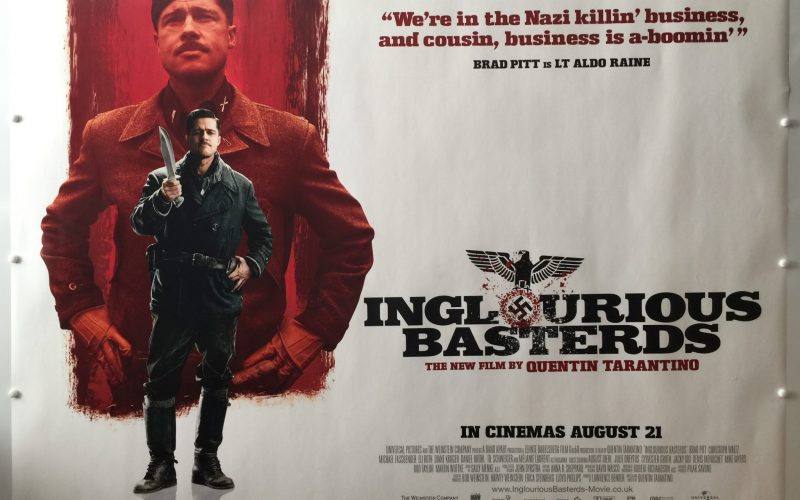Quentin Tarantino’s first 25 years, Part 7 – Inglourious Basterds (2009).
By 2009 Quentin Tarantino had solidified his mark on modern cinema with an almost impeccable run of films from his blistering 1992 debut, Reservoir Dogs through to the epic, two-part, homage-fest that was 2003/04’s Kill Bill saga. It was 2007’s experimental tribute to Grindhouse cinema, Death Proof, that proved to be Tarantino’s first misstep but even that film, which by its very nature was made to be intentionally bad, had things in it that were worthy of admiration, in particular some incredible action and stunt work in its finale.
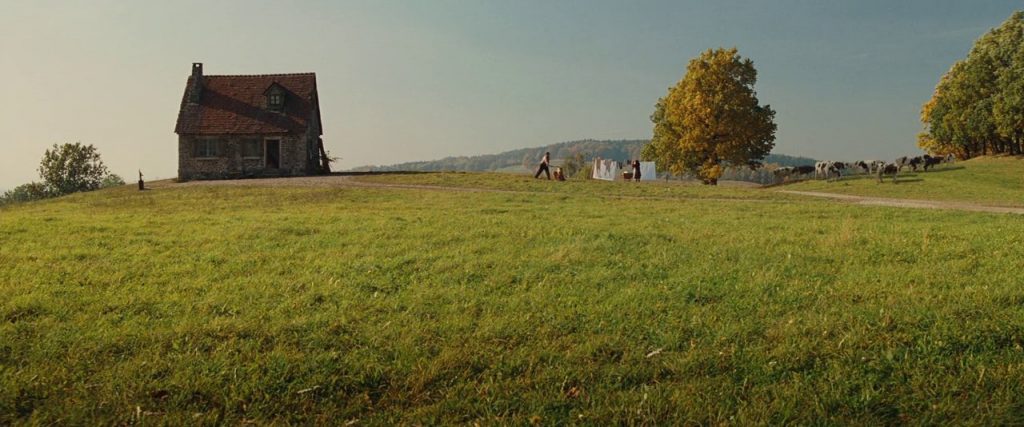
Having made his mark on the crime drama genre, albeit films infused with that unmistakable Tarantino cool and pop culture reverie, Tarantino’s next film would be a first for the auteur director for a number of reasons. Firstly it was his first film with an historical setting, in this case the European theatre of World War II. Secondly it was his first attempt at a remake, of sorts, in this case a remake, or reimagining of Enzo Castellari’s 1978 exploitation film, The Inglorious Bastards. I say a remake of sorts as Tarantino’s version, now dropping the “The” and tweaking the spelling of both “Inglorious” and “Bastards”, bears little resemblance to Castellari’s film, which itself was a lesser facsimile of the far superior The Dirty Dozen.
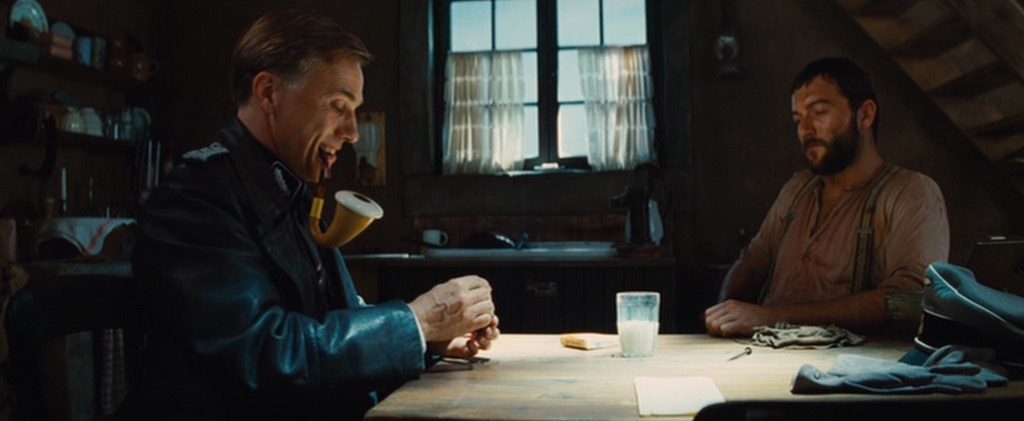
Tarantino’s Inglourious Basterds was released in August of 2009 to mostly positive critical response and was later nominated for eight Academy Awards with one win for Supporting Actor for Christolph Waltz. Along with the then virtually unknown Waltz, Tarantino assembled a sterling cast ranging from Hollywood A-listers such as Brad Pitt through to a superb European contingent featuring the likes of Diane Kruger, Mélanie Laurent, Daniel Brühl, Til Schweiger and in a brief but memorable turn in the film’s electrifying opening scene, Denis Ménochet. Mike Myers is covered in a layer of make-up to age him as a British General Ed Fenech (a nod to Giallo actress Edwige Fenech?) Even less recognisable is Rod Taylor (The Time Machine, The Birds) as Winston Churchill. Tarantino’s friend and fellow director Eli Roth also appears in a fairly significant role as does the ever reliable Michael Fassbender.

The film opens with arguably its most memorable scene. Set in the beautiful French countryside, made to look all the more spectacular by Tarantino’s favoured cinematographer Robert Richardson, we see a farmer, Perrier LaPadite as his idyllic day is disturbed by the arrival of Christoph Waltz’ SS Colonel Hans Landa. Landa engages LaPadite in a verbal game of cat and mouse that lasts almost twenty minutes as he toys with the Frenchman, at times disarming both him and us, the audience, with his surface charm and polite small talk all the while exuding an ever present menace. We are told that Landa is nicknamed the “Jew Hunter” and is the best there is at what he does. LaPadite seems guarded but unfazed by Landa but it is us, the audience who sees, as the camera pans under the floor, that LaPadite has every reason to play it cool. What follows is a demonstration of Tarantino’s complete mastery of filmmaking as the tension is ramped up to almost unbearable levels. The dialogue, editing and performances in this bravura opening scene all coalesce with a precision that will follow throughout the film’s lengthy two and a half hour runtime.
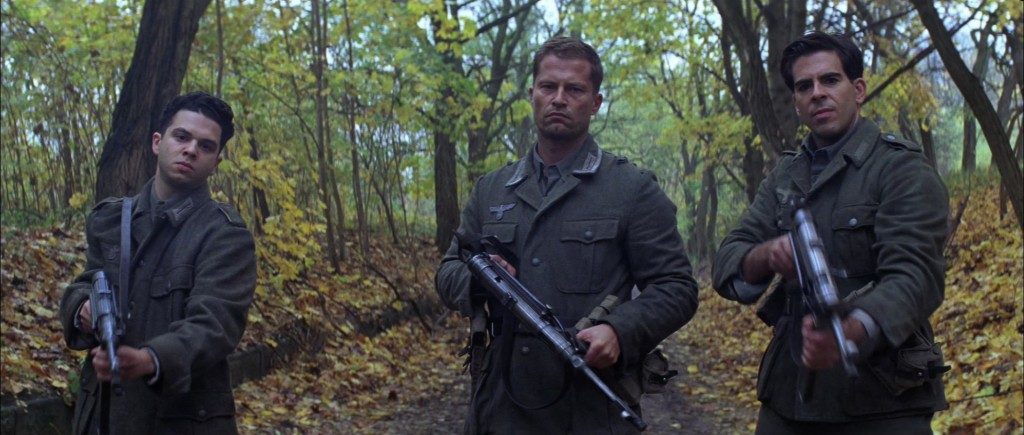
Once Landa has been established as the main villain of the film we are then introduced to both our protagonists, the Jewish, Nazi hunting Basterds of the film’s title led by Brad Pitt’s Lt. Aldo Raine, and the main thread of the plot which is the plan to assassinate top Nazi officials by way of a combination of infiltration using undercover agents such as Michael Fassbender’s Lt. Archie Hicox and the help of those within Nazi occupied France who are sympathetic to the Allied’s cause such as Diane Kruger’s Bridget von Hammersmark. The sheer brutality of the means which the mostly American Basterds utilise to get the job done contrasts nicely with the subterfuge used by the Brits. This leads to several key extended dialogue scenes throughout the film that often, but not always, culminate in explosive moments of violence and it’s the tension of the build up that is pitched so perfectly both in terms of the scripted dialogue and performances coupled with the usual flawless editing skills of the late Sally Menke (in her last collaboration with Tarantino before her tragic death in 2010) that make this such an effective edge-of-your-seat slice of entertainment.
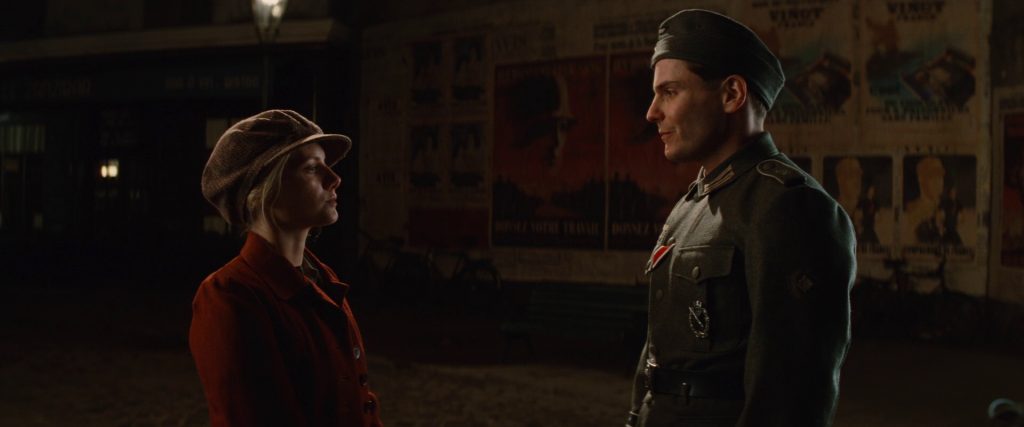
Much like the Kill Bill films crossed over into several genres, Inglourious Basterds straddles drama, thriller and war film with deft aplomb but all the while has moments of both light and also the very blackest humour laced throughout it. For a film that breaks the two and a half hour barrier, it flies by with a fairly brisk pace that is in some part due to how gripping many of the long dialogue scenes are. Following the incredibly tense opening is no easy feat but in a later scene where Archie Hicox and his team share a drink with August Diehl’s Major Hellstrom, an incredibly astute Nazi who may or may not have suspicions as to Hicox’s true identity. In such a relatively brief role, Fassbender leaves his mark on the film in a big way. Hicox’s resolve and his dedication to maintaining the subterfuge is relentless but one small non-German colloquialism gives the game away and the resultant confrontation is as brilliantly staged as the tense build-up.
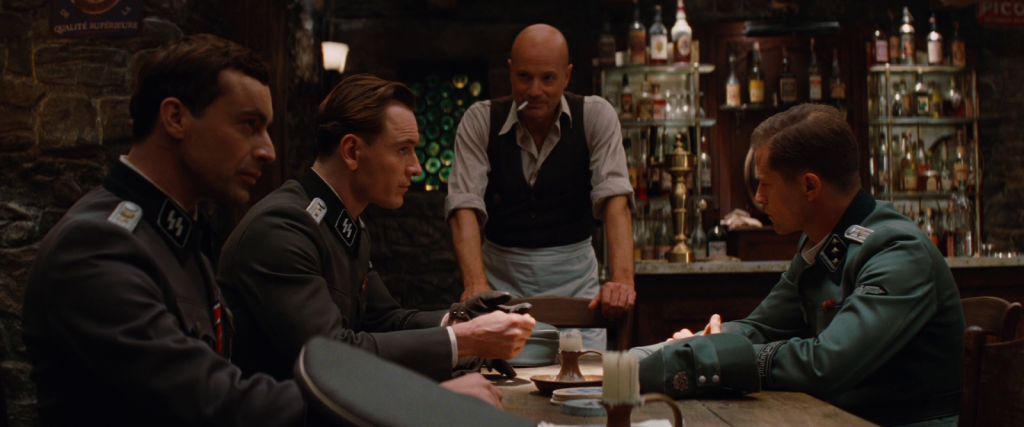
The Basterds of the title, for all their borederline comic, Nazi killing brutality play second fiddle to the film’s true hero, the young French woman, Shosanna who runs a cinema in Nazi occupied Paris and now goes by the name Emmanuelle Mimieux. The reason for her name change being that she’s hiding both her true Jewish identity and later on, the fact that she is the very same young woman whom Landa allowed to escape at the conclusion of the film’s opening scene. Shosanna/Emmanuelle becomes the centre of the tale when none other than Joseph Goebbels himself (a brilliant Sylvester Groth) plans to show his latest German propaganda film, Nation’s Pride, at her cinema. The star of Nation’s Pride is Private Fredrick Zoller played by the brilliant Daniel Brühl (Rush, Captain America: Civil War) and Goebbels’ film focuses on Zoller’s exploits as the most successful sniper in the German army. The scene where Zoller introduces Emmanuelle to Goebbels and he espouses of his love of film is littered with nods to Tarantino’s own love of cinema.
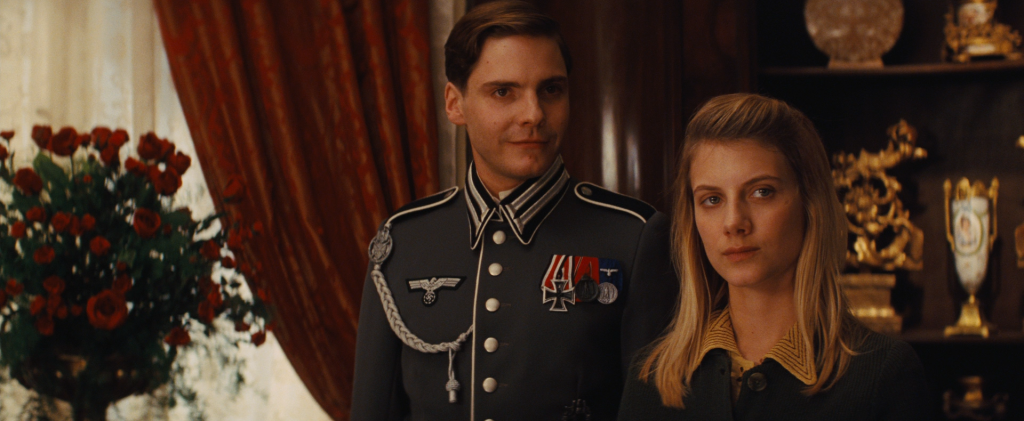
In many ways, Inglourious Basterds is a celebration of film on many levels. It’s the medium of cinema that entices both Goebbels and in turn Hitler himself to fall into the Basterds’ trap after they enlist the help of Emmanuelle and it’s this love of film that ultimately brings about Hitler’s demise. And it’s here that Tarantino plays what remains his most wickedly subversive trick on the audience and where his “Tarantinoverse” veers away most sharply from our own reality. In our world, Hitler took his own life in 1945 but in Tarantino’s Universe the Basterds, aided by both the Brits and the French Resistance, are successful in trapping the Nazi top brass in the cinema where they meet their demise in a fiery celluloid fuelled inferno.
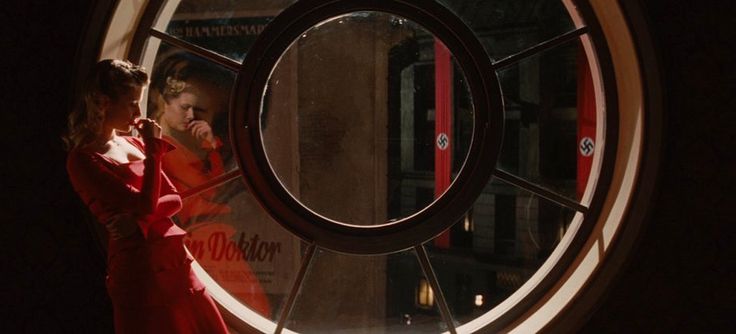
The denouement of the massacre reaches a grandstanding crescendo when Hitler’s body and face is riddled with bullets in a scene both gratuitous and gleefully gratifying. In Tarantino’s slightly skewed reality, the world’s biggest bastard meets a far more fitting end than he did in ours. This rewriting of history is a stroke of genius and even the most ardent historians would surely forgive Tarantino this one piece of artistic license. It’s Landa, the villain of the piece who survives the Basterds’ cull of the Nazi hierarchy after he surrenders to them only to be left with a permanent physical reminder of his prior affiliation with a well placed Swastika from Lt. Raine. It’s a brutal but satisfying end to a film that is easily the best of Tarantino’s most recent output. It looks gorgeous throughout, Robert Richardson’s cinematography is uniformly superb in every film he’s subsequently made under Tarantino’s direction. The look of the film and the visual authenticity of the period it’s aiming to recreate is bolstered by brilliant set and costume design. Every facet of the production is quality and above all the editing by Sally Menke is the thing that stands out for me as from this point onwards, Tarantino’s two subsequent films seem rather bloated without her keen eye for what scenes are necessary and what is just excessive indulgence.
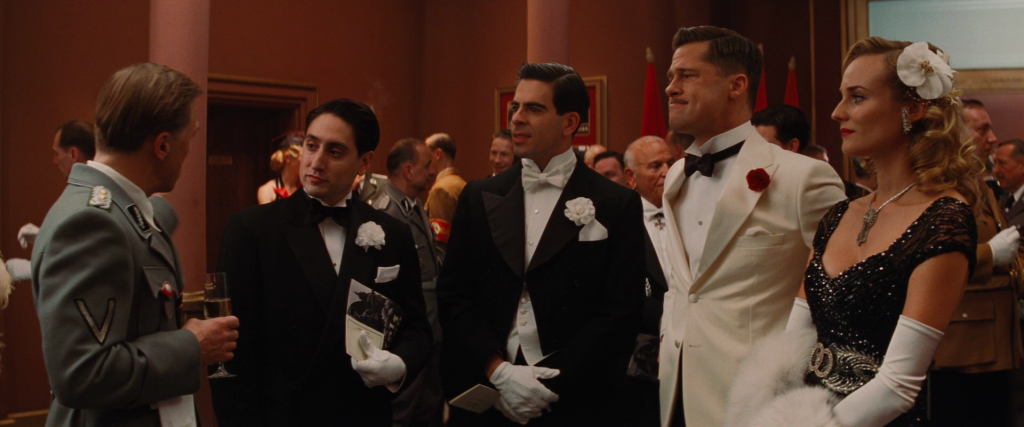
There are areas where valid criticism could be laid against the film. Given that he was front and centre of the film’s marketing campaign, Brad Pitt’s performance is vastly overshadowed by the likes of Fassbender, Brühl, and especially Waltz and often veers uncomfortably close towards the absurd with his almost Popeye-esque mannerisms and quirkiness. Some of the extended dialogue scenes don’t play as well on repeat viewings as in some of Tarantino’s earlier films, Pulp Fiction especially, but this is a minor criticism. Oh and that history altering turn the film takes in the final massacre may not sit well with everyone but that’s purely down to how invested one is in the idea that the director’s films take place in some alternate universe to our own. Personally I think it’s a stroke of genius but that’s just me.
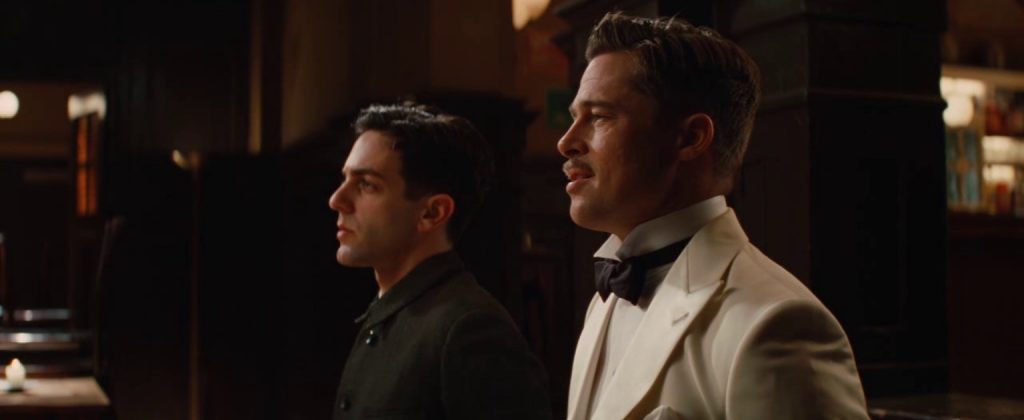
Inglourious Basterds is regarded by some as Tarantino’s masterpiece and whilst it’s a film that I’ve grown to appreciate more with each subsequent viewing I would still lean towards Tarantino’s first three films as being the peak of his filmography. That said, it is easily the best film he’s made in the middle to latter part of his directorial career. If you haven’t seen Inglourious Basterds, do so without hesitation. It’s a masterclass in filmmaking that ramps the tension up to levels that few films of its kind can match. It’s cast is exemplary, especially the European contingent and the degree of craft on show, the writing, cinematography, editing, production design and direction are second to none.
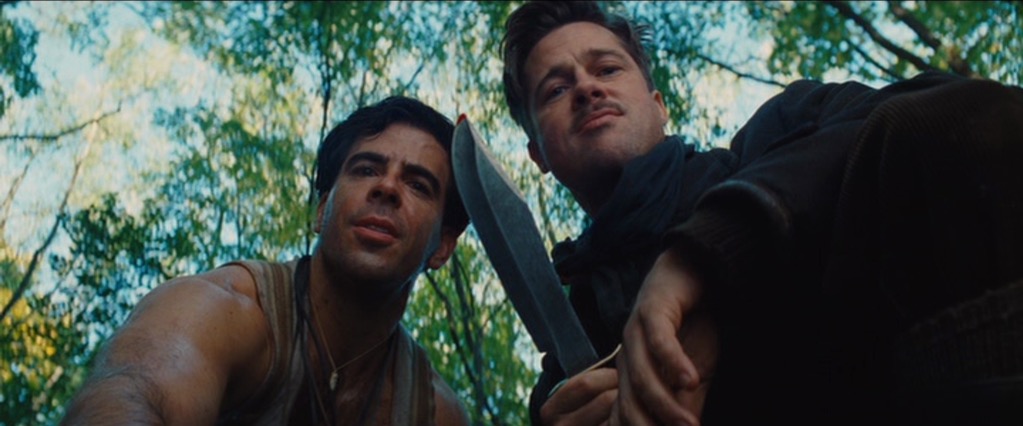
If you have seen Inglourious Basterds and maybe weren’t taken by it, give it another chance. Truth be told, I wasn’t overly keen on it upon first seeing it theatrically in 2009 as I was still reeling from what I felt was a level of self indulgence that had reared its head in Tarantino’s films. I will now happily admit that I was wrong. It could certainly be perceived as self indulgence but when that indulgence is of a love of film and the need to celebrate film by paying homage to past influences, the now older and wiser cinephile within me can’t help but applaud such a thing. Tarantino is a modern auteur like few others. He makes the films he wants to see, films that are richly influenced by his vast knowledge of film history and a love of cinema that is plain to see in everything he does. Inglourious Basterds is proof that whatever the genre, Tarantino can turn his hand to almost anything and create wonderful and unique works of film. Few would argue that Hollywood’s obsession with remakes is a great thing but here, Quentin Tarantino has taken a film that few modern day filmgoers would have heard of let alone seen and has remade it into a masterpiece. Now imagine what he’d do if he tackled another genre… the Western perhaps?
Film ’89 Verdict – 9/10

